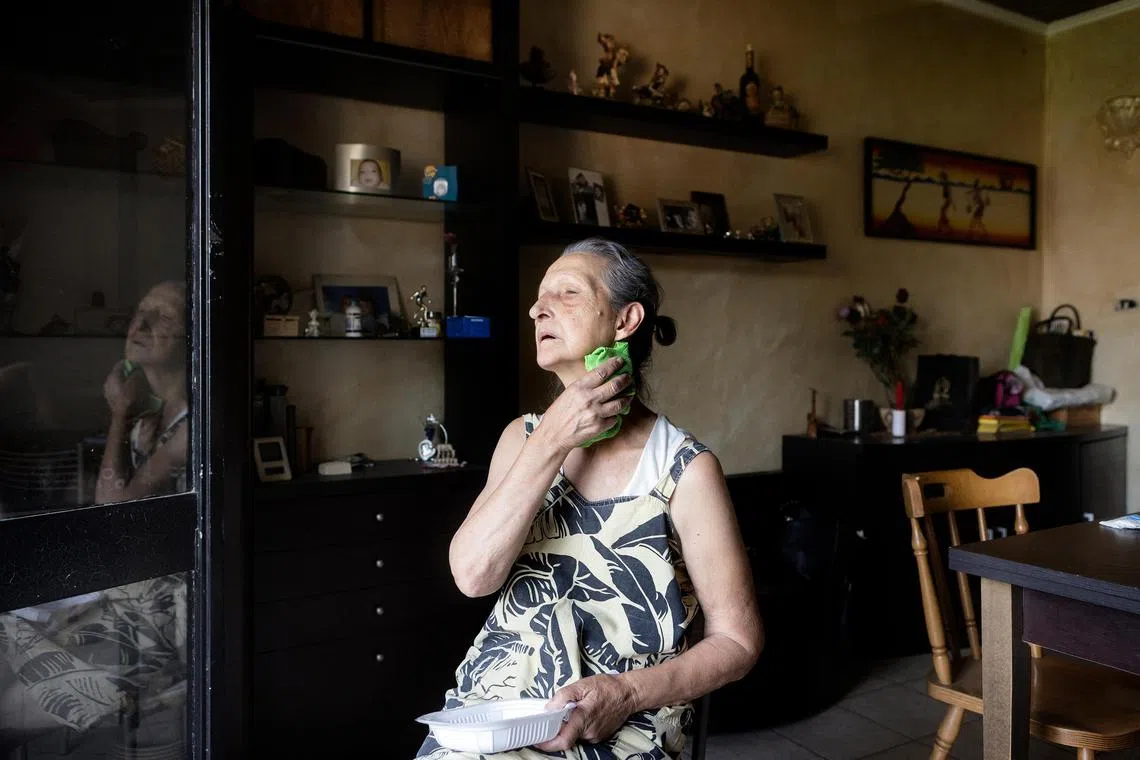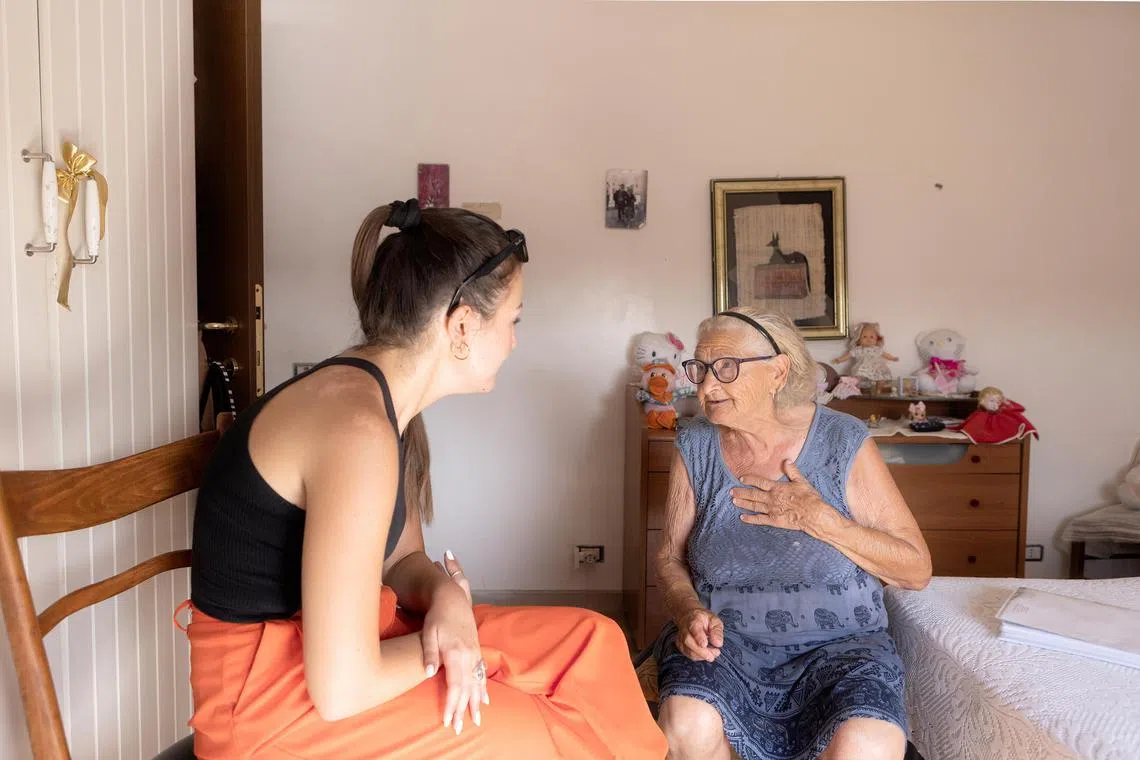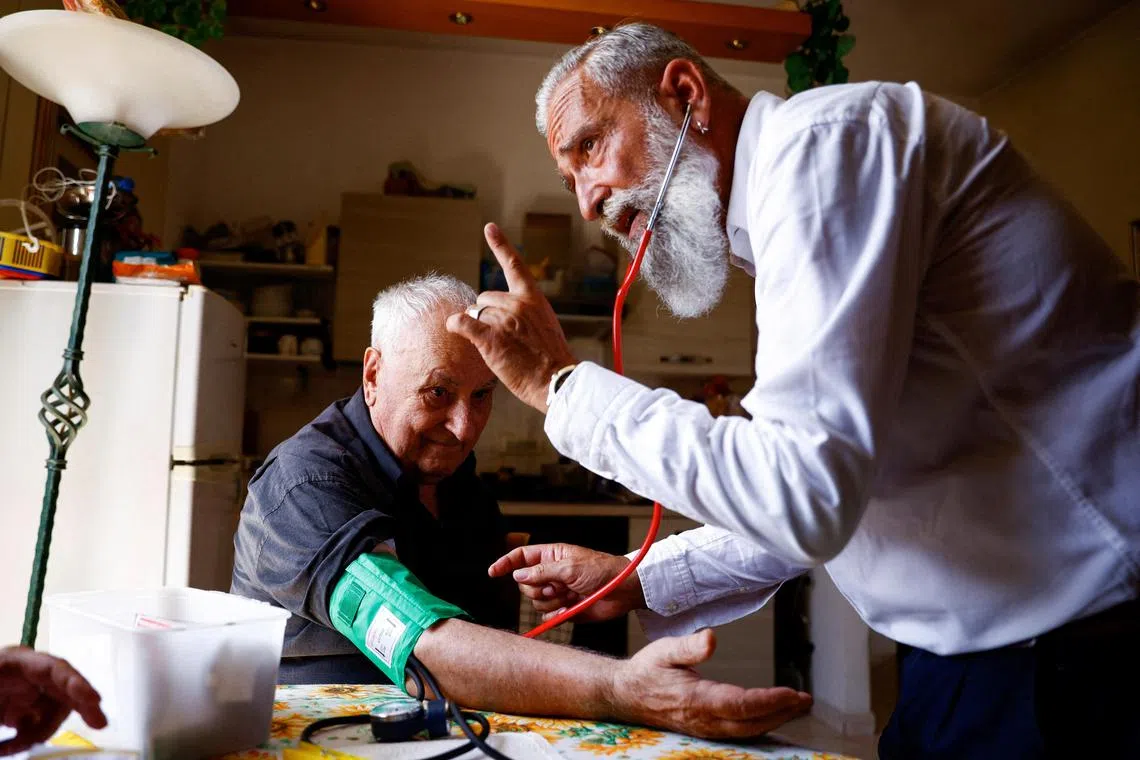For Europe’s older population, heat is the new Covid-19
Sign up now: Get ST's newsletters delivered to your inbox

Ms Donata Grillo, 75, refreshing herself with a wet sponge in front of a window at her home in Rome.
PHOTO: NYTIMES
ROME – As a light, hot breeze blew through her living room and her grey hair, Ms Donata Grillo, a 75-year-old cancer survivor with a pacemaker and serious sight problems, sat next to her balcony, a damp sponge on her lap.
It was all she had to keep cool this week as temperatures topped nearly 41 deg C in her native Rome.
She does not have any air-conditioning or fans, or even a functioning refrigerator, in her two-bedroom apartment in a public housing complex on the city’s periphery, next to a hospital and a highway.
“It is the feeling of straining pasta all day long,” Ms Grillo said, twirling her hands to mimic the pouring of boiling water from a pot. A visit from a social worker was about the only contact she had had in days, the heat having shunted her inside.
“Don’t go anywhere; it’s too hot and dangerous for you,” Ms Carlotta Antonelli, 28, who works with the Roman Catholic charity Caritas, told her during her rounds on Wednesday.
The successive heatwaves that have scorched Italy and the rest of southern Europe
But for many seniors, heat has become the new Covid-19.
The searing temperatures have settled over the continent like another indiscriminate plague, reinforcing the isolation of many older people and the threats to their health, and pushing governments and social services to take extraordinary steps to try to protect them.
“These days, they are even more alone,” Ms Antonelli said as she drove her car through two large, low-income suburban areas where her charity routinely assists dozens of residents. She visits Ms Grillo once a week to help her with daily chores and assist with medical appointments and legal problems.
As temperatures rise, the threat to Europe’s elderly is now widespread, with southern European nations joined by others as far north as Belgium in putting heat plans in place, many aimed at safeguarding older populations.
For Italy, the extreme heat has forged a pincer with the country’s most pressing demographic trend – an ageing population – to present an especially acute crisis. About 24 per cent of Italians are older than 65, making it the oldest country in Europe, and more than four million of them live alone.
In 2022, Italy was exposed to extreme temperatures for longer than most other European countries, enduring three major heatwaves.
Almost 30 per cent of the 61,000 people estimated to have died last summer from extreme heat in Europe were Italians, with age playing a significant factor.
The number of Italians older than 80 is now about 4.5 million, almost double the number 20 years ago.
“Older people with pre-existing illnesses are more vulnerable,” Professor Andrea Ungar, the president of Italy’s Society of Gerontology and Geriatrics, said in a phone interview. “But poverty and isolation also play a crucial role.”
Europe’s hottest summer on record, in 2003, left more than 70,000 people dead, by some estimates, and since then, Italy has only grown older. It has struggled to adapt.
“It was hot even before 2003 in Italy, and we already had a large population of elderly people, but not like nowadays,” said Dr Francesca De Donato, a public health researcher whose department gathers meteorological and demographic data from across the country to issue the daily bulletins for heat-related health warnings, tailored by city.
“The quota of people at risk has been constantly growing here,” Dr De Donato noted.

Ms Carlotta Antonelli, a social worker, during a visit with senior Francesca Azzarita in Rome.
PHOTO: NYTIMES
After 2003, Italy became one of the first countries in Europe to put in place a national plan to mitigate the impact of extreme heat, based on guidelines from the World Health Organisation.
The measures include an alert system to warn people to modify their behaviour to safeguard their health. The authorities have recently urged hospitals and general practitioners to pay special attention to the most vulnerable people, and they have a free phone number people can call to seek advice or help for heat-related problems.
Days like Wednesday, when the heatwave peaked, are marked in red on the daily bulletin that Italy’s Health Ministry issues to warn residents.
Television channels periodically broadcast the ministry’s guidelines, advising people to stay indoors during the hottest hours; to wear light clothes and sunscreen; to drink lots of water, eat fresh fruits and avoid coffee and alcoholic beverages; and to be particularly careful when going outside.
As rising temperatures creep north to countries less accustomed to them, Belgium has set up a three-step heat plan, based on regular monitoring of temperature and ozone levels.
In Brussels, seniors and those who feel isolated or vulnerable can register over the phone with municipal authorities, who will check on them regularly as soon as temperatures climb above 28.9 deg C.

Dr Claudio Consoli checking the blood pressure of a patient as he visits him at home to give assistance and check on how he is coping with the heat.
PHOTO: REUTERS
The social workers distribute fluids and check living conditions. Still, Belgium’s excess mortality rate rose to 5.7 per cent during the hottest months last summer, the highest in 20 years.
In Greece, the country’s archaeological sites will be closed between noon and 5.30pm up to and including Sunday, when temperatures are set to reach 43.9 deg C in Athens.
The Ministry for Civil Protection has said that all government services are “in a state of increased readiness to deal with the consequences of high temperatures”.
There, as elsewhere, the advice from the authorities amounts to a simple imperative: Stay home. That has placed a special onus on governments and social workers to make sure isolation itself does not become a hazard.
In Rome, a team of regional health professionals checks in via phone calls with the most vulnerable people, mostly the elderly and infirm, on days flagged orange or red for the most severe heat.
While the hardships and isolation of the most vulnerable in many ways echo the fight against Covid-19, the pandemic also left some good practices in place, including visiting and treating people in their homes, health officials said.
A 2022 law, passed by the government of former prime minister Mario Draghi, pushed for better coordination between health services and telemedicine.
Italian health authorities are working to have one digital platform with updated patient information that visiting nurses, doctors, emergency services and hospitals can access. NYTIMES


